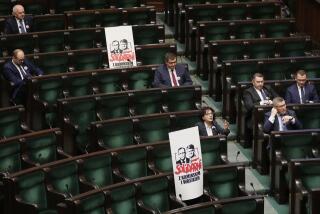Polish Police Acquitted in 1981 Deaths of 9 Solidarity Protesters
- Share via
WARSAW — To the anguish of widows and the outrage of Solidarity leaders, a court presiding over the largest trial to stem from the 1981 Communist crackdown in Poland acquitted 22 riot police Friday of killing nine protesting miners.
Cries of “Shame, shame” went up in the courtroom in the southern industrial center of Katowice when Chief Justice Ewa Krukowska announced that evidence was inadequate to prove the defendants’ guilt.
The verdict--which comes eight years after the Communists were replaced by a democratic government--came as a surprise to the 100 courtroom spectators, who clearly expected a conviction.
“They took our husbands and fathers, and now [the court] is covering the murderers,” said Teresa Kopczak, whose husband, Boguslaw, was 28 when he died.
Prosecutors had sought prison terms of eight to 15 years for the defendants, now mostly in their 40s, who were accused of opening fire on hundreds of protesting miners 16 years ago. The Justice Ministry said it will appeal the verdict.
Speaking in the shipyard port of Gdansk, Solidarity founder Lech Walesa called the verdict scandalous.
“The point is that, if people are killed, someone has to be responsible for that,” Walesa said.
The riot police were dispatched to Katowice and other Solidarity strongholds on the first day of martial law, Dec. 13, 1981, by a government anticipating resistance to the loss of basic freedoms and the jailing of Solidarity leaders.
When miners who had barricaded themselves in the Wujek and the Manifest Lipcowy mines would not budge on the third day, riot police opened fire, killing nine protesters and wounding 25.
In the end, the 1 1/2-year crackdown claimed the lives of 100 government opponents before it was lifted in July 1983.
The verdict in Katowice lent an air of disillusionment to a community already slumping under market reforms that have taken a heavy toll on the once-thriving mining and steel industries.
Ballistic evidence that could have proven who fired the fatal shots was confiscated at the time by Communist military prosecutors and has never been recovered.
A miner, Andrzej Sedurek, noted bitterly: “Enough time has elapsed since the killings to erase proof.”
More to Read
Sign up for Essential California
The most important California stories and recommendations in your inbox every morning.
You may occasionally receive promotional content from the Los Angeles Times.













